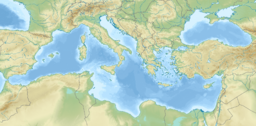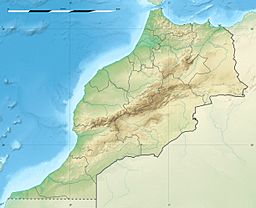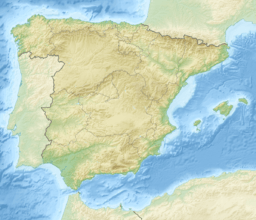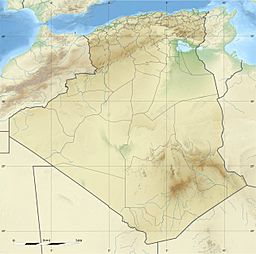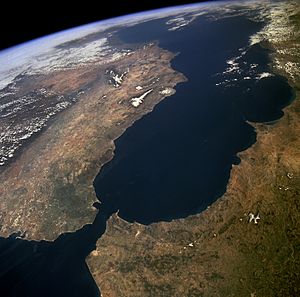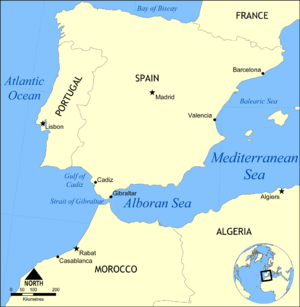Alboran Sea facts for kids
Quick facts for kids Alboran Sea |
|
|---|---|
| Mar de Alborán | |
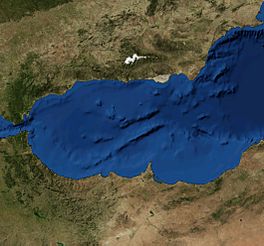 |
|
| Location | Southern Europe and North Africa |
| Coordinates | 36°0′N 3°0′W / 36.000°N 3.000°W |
| River sources | Guadalhorce River, Guadalfeo River, Adra River (Spain) and Nekor River (Morocco) |
| Ocean/sea sources | Atlantic Ocean |
| Basin countries | Algeria, Gibraltar (UK), Morocco, and Spain |
| Average depth | 445 metres (1,460 ft) |
| Max. depth | 1,500 metres (4,900 ft) |
| Settlements | Málaga, Motril, Almería and Cartagena, Spain Alhucemas and Nador, Morocco, Gibraltar |
The Alboran Sea is the westernmost part of the Mediterranean Sea. It lies between Spain to the north and Morocco and Algeria to the south. The Strait of Gibraltar connects the Alboran Sea with the Atlantic Ocean. This strait is at the sea's western end.
Contents
Where is the Alboran Sea?
The Alboran Sea is not very deep. Its average depth is about 445 meters (1,460 feet). The deepest point is around 1,500 meters (4,900 feet).
Defining the Sea's Borders
The International Hydrographic Organization helps define the exact edges of seas. For the Alboran Sea, they say:
- To the West: The border is a line connecting Europa Point in Gibraltar (Europe) to Península de Almina in Ceuta (Africa). This line marks the eastern edge of the Strait of Gibraltar.
- To the East: The border is a line from Cabo de Gata in Andalusia, Spain (Europe) to Cap Fegalo, near Oran, Algeria (Africa).
Islands of the Alboran Sea
Several small islands are scattered across the Alboran Sea. One of them is called Isla de Alborán, which gives the sea its name. Most of these islands belong to Spain, even those that are very close to the African coast.
How the Alboran Sea Formed
The seafloor under the Alboran Sea is very complex. It has many different shapes, including deep areas called sub-basins, long raised areas called ridges, and underwater mountains called seamounts.
Moving Continents and Earthquakes
The land beneath the Alboran Sea and the mountains around it (like the Gibraltar Arc and Atlas Mountains) are mostly made of continental crust. This area marks where the African Plate and Eurasian Plate once collided. This collision happened when an ancient ocean, the Tethys Ocean, closed up.
Even today, earthquakes happen deep under the sea. This shows that the Earth's plates are still moving and interacting. These movements are shaping the region. The rocks in this area are very old, from the Late Paleozoic and Triassic periods. They have been pushed up and stretched out over millions of years.
The Alboran Ridge
One of the most noticeable features in the Alboran Sea is the Alboran Ridge. This underwater ridge is about 180 kilometers (110 miles) long. It stretches southwest from the volcanic Alborán Island.
Ocean Currents and Water Flow
The Alboran Sea has interesting water movements.
- Surface currents flow eastward. They bring water from the Atlantic Ocean into the Mediterranean Sea. These currents are affected by the winds.
- Deeper currents flow westward. They carry saltier water from the Mediterranean Sea back into the Atlantic Ocean, over a shallow area called the Gibraltar sill.
This creates a kind of spinning movement of water, like a giant whirlpool, called a gyre. This constant exchange of water is very important for the sea's environment.
Amazing Sea Life
The Alboran Sea is a special place because it's a mix of ocean and sea environments. It has species found in both the Mediterranean and the Atlantic.
Home to Important Animals
The Alboran Sea is home to:
- The largest group of bottlenose dolphins in the western Mediterranean.
- The last group of harbour porpoises in the western Mediterranean.
- It's a very important feeding area for loggerhead sea turtles in Europe.
Fishing and Conservation
Many important fish are caught here, like sardines and swordfish. However, there have been concerns about fishing methods. In 2003, the World Wildlife Fund (WWF) worried that widespread drift net fishing was harming dolphins, turtles, and other marine animals.
Mountains and Biodiversity
A chain of mountains, called the Gibraltar Arc, surrounds the Alboran Sea. These mountains include the Baetic Cordillera in Southern Spain and the Rif Mountains in Morocco.
These mountains are known as a "biodiversity hotspot." This means they have a huge variety of plants and animals. Like the Alboran Sea itself, these mountains are a transition zone between the Mediterranean and Atlantic (Macaronesian) environments. The Atlantic's mild climate has helped many ancient species survive here. These species might have died out elsewhere around the Mediterranean Sea due to climate changes over millions of years.
Islands of the Alboran Sea
Here are some of the small islands found in the sea:
- Isla de Alborán
- Islas Chafarinas
- Peñón de Alhucemas
- Peñón de Vélez de la Gomera
See also
 In Spanish: Mar de Alborán para niños
In Spanish: Mar de Alborán para niños
 | Stephanie Wilson |
 | Charles Bolden |
 | Ronald McNair |
 | Frederick D. Gregory |


